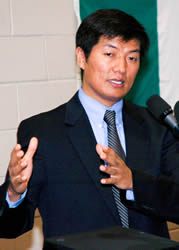Forum links struggles of Irish, Tibetans
CAMBRIDGE -- A Tibet-born Harvard Law School research fellow led a March 10 discussion of the struggles of his own people, those of the Irish and the possibility of a Good Friday Accords-type understanding between Tibet and the Chinese regime.
When China asserted its current dominion over Tibet in the 1950s, it sparked a resistance that took more than 1 million lives over the next 15 years. The violent resistance ended after many of the Tibetan leadership class escaped to India to form a government in exile and the rise of the current Dali Lama, who espouses non-violence, said Lohsang Sangay, the first Tibetan to graduate from the Harvard Law School.
“The Dali Lama does not say form an IRA because violence begets violence,” he said to the audience at the DiGiovanni Hall at Harvard Square’s St. Paul Church.
The 1998 Good Friday Accords came after centuries of violence, he said. “What the Dali Lama is saying is: Why have the violence? Why not leap forward over the violence at the next stage?”
Both Tibet and Ireland are known as nations of scholars and saints, said Jerome D. Maryon, the president of St. Paul’s Lay Committee on Contemporary Spiritual-and-Public Concerns, the event’s sponsor.
Maryon said both nations have roughly 6 million people and have suffered greatly at the hands of a neighboring dominant power.
The loss of life from the hostile takeover by the Chinese and the Tibetan resistance was similar to the 1 million Irish who starved during the potato famine of the 1840s; a famine caused by English policies and exasperated by English callousness, he said.
Tibet’s Buddhist culture left the country unable to defend itself when the Chinese came, Sangay said. Like Ireland, Tibet was neutral during the Second World War, and even refused American requests for passage to support its supply lines.
The Chinese, like the English did with Ireland, have waged a war of cultural domination, as well, he said.
China has sponsored a massive emigration by members of China’s dominant ethnic group, the Han, into Tibet, where they now hold sway in the cities and ever more so in the villages, he said.
The Tibetan language is not used in the classroom beyond the middle school grades and Mandarin Chinese is now the official language of government and commerce, he said.
Maryon, warming to the irony, said the Irish have had the ultimate revenge of being able to vividly describe the crimes of the English to them in their own language.
Sangay said the end result of Chinese policy is to make Tibetans foreigners in their own land.
Young people have to choose between a hard life within the Tibetan culture and its traditions or a more prosperous future by joining the power structure linked and controlled by the Chinese Communist Party, he said.
Despite Chinese laws that establish autonomy for the ethnic minorities and promote decentralized management of local affairs, there has never been a Tibetan to hold the office of party general secretary of Tibet and the Politburo always has a majority of ethnic Chinese, he said.
For the Irish, there was the opportunity to escape to America, where they were free to rise and flourish. That opportunity is not available to the Tibetans, he said. Instead, refugees must cross the Himalayan Mountains to the south to reach India.
Along the border with India, Chinese border guards shoot Tibetans attempting the crossings, he said. Because of this, most refugees make the attempt in the deepest snows of winter, when the border guards are more likely to remain in their garrisons.
The Dali Lami has a moderate proposal, which accepts Tibet as a province of China in exchange for an autonomous and democratic government recognized by Beijing, he said.
Once this is agreed to by Chinese government, the Dali Lama will renounce his political rights and roles and assume his preferred part as the spiritual leader of his people, he said.
However, whenever a delegation from the Dali Lama meets with the Chinese in Beijing, the Chinese news agency merely reports that a group of tourists from the Tibetan province visited with government leaders, he said.
The popular pressure behind the forging of the Good Friday Accords came from the 40 million Americans of Irish descent, he said. Pressure for a similar breakthrough will come one of two ways.
The first is through the moral suasion of the Dali Lama and his growing popularity in the West, he said. Having lost his country, the Dali Lama has gained a worldwide prominence. The Dali Lama’s profession of non-violence is a stark contrast to the brutal Chinese oppression. This contrast becomes powerful leverage as China attempts to be a fuller member of the family of nations.
The second option is the one most hope will not come to pass, Sangay said. “The hold on the Tibetan people by the Dali Lama is absolute. As long as he is committed to non-violence, the people are committed,” he said.
“After the Dali Lama there may be no other option than violence,” he said.



















